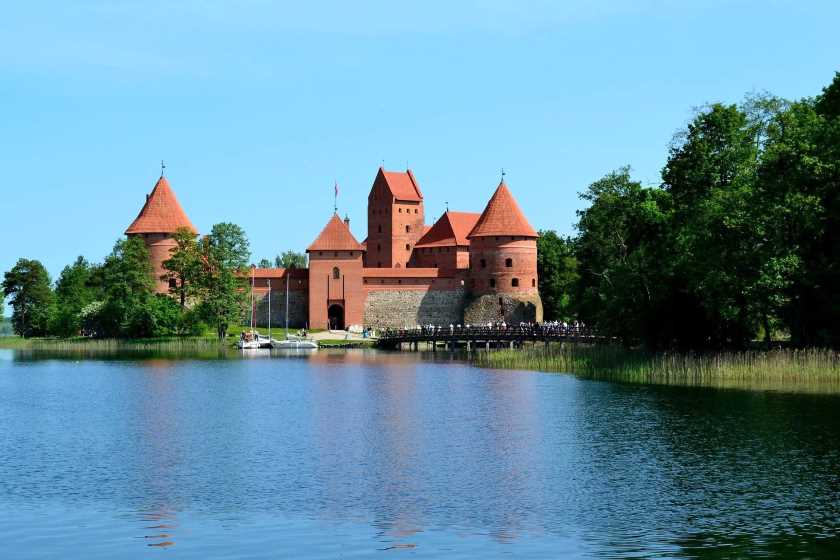Friday, August 23, 2024 As of August 2024, Lithuania has emerged as a global citizen. Its passport is offering visa-free or visa-on-arrival access to 185 countries including Indonesia, Saudi Arabia, Türkiye and the USA. This remarkable achievement places Lithuania among the top nations in terms of travel freedom.
Also, it significantly impacts its economic mobility, tourism industry, and related sectors. The increased accessibility to global destinations benefits Lithuanian citizens, airlines, hotels, and the broader economy. This article delves into the implications of Lithuania’s visa-free travel policy, examining its impact on economic mobility, the airlines capitalizing on this freedom, and the major hotels contributing to Lithuania’s thriving tourism sector.

The Henley Passport Index and Lithuania’s Global Standing The Henley Passport Index, a globally recognized ranking of passports according to the number of destinations their holders can access without a prior visa. This ranks Lithuania’s passport as one of the strongest in the world. With visa-free or visa-on-arrival access to 185 countries, Lithuanian citizens enjoy unprecedented freedom of movement.
This freedom not only enhances personal travel opportunities but also facilitates international business, education, and cultural exchanges, which are critical for economic mobility. Here is the list of 185 countries that Lithuanian citizens can travel to visa-free: Albania American Samoa Andorra Angola Anguilla Antigua and Barbuda Argentina Armenia Aruba Austria Bahamas Bahrain Bangladesh Barbados Belarus Belgium Belize Bermuda Bolivia Bonaire, St. Eustatius and Saba Bosnia and Herzegovina Botswana Brazil British Virgin Islands Brunei Bulgaria Burkina Faso Burundi Cambodia Canada Cape Verde Islands Cayman Islands Chile Colombia Comoro Islands Cook Islands Costa Rica Croatia Curacao Cyprus Czechia Denmark Djibouti Dominica Dominican Republic Ecuador Egypt El Salvador Estonia eSwatini Ethiopia Falkland Islands Faroe Islands Fiji Finland France French Guiana French Polynesia French West Indies Georgia Germany Gibraltar Greece Greenland Grenada Guam Guatemala Guinea-Bissau Haiti Honduras Hong Kong (SAR China) Hungary Iceland Indonesia Iran Iraq Ireland Israel Italy Jamaica Japan Jordan Kazakhstan Kenya Kosovo Kuwait Kyrgyzstan Laos Latvia Lebanon Liechtenstein Luxembourg Macao (SAR China) Madagascar Malawi Malaysia Maldives Malta Marshall Islands Mauritania Mauritius Mayotte Mexico Micronesia Moldova Monaco Mongolia Montenegro Montserrat Morocco Mozambique Myanmar Namibia Nepal Netherlands New Caledonia New Zealand Nicaragua Niue North Macedonia Northern Mariana Islands Norway Oman Pakistan Palau Islands Palestinian Territory Panama Paraguay Peru Philippines Poland Portugal Puerto Rico Qatar Reunion Romania Rwanda Samoa San Marino Sao Tome and Principe Saudi Arabia Senegal Serbia Seychelles Sierra Leone Singapore Slovakia Slovenia Solomon Islands Somalia South Korea Spain Sri Lanka St.
Helena St. Kitts and Nevis St. Lucia St.
Maarten St. Vincent and the Grenadines Suriname Sweden Switzerland Taiwan (Chinese Taipei) Tajikistan Tanzania Thailand The Gambia Timor-Leste Tonga Trinidad and Tobago Tunisia Turks and Caicos Islands Tuvalu Türkiye Ukraine United Arab Emirates United Kingdom United States Uruguay US Virgin Islands Uzbekistan Vanuatu Vatican City Venezuela Zambia Zimbabwe Impact on Economic Mobility Economic mobility, as measured by the Economic Mobility Index, refers to the ability of individuals or households to improve their economic status over time. Lithuania’s enhanced global access through visa-free travel significantly boosts its citizens’ economic mobility.
Increased Business Opportunities : Lithuanian entrepreneurs and business professionals can explore international markets more easily, forging new partnerships and expanding their businesses. This global access reduces the barriers to entry in foreign markets, allowing for greater economic diversification and growth. Higher Educational Access : With visa-free access to countries with world-class educational institutions, Lithuanian students can pursue higher education opportunities abroad without the hassle of visa applications.
This leads to an increase in the skill set of the population, contributing to the nation’s overall economic development. Enhanced Employment Prospects : Visa-free travel opens doors to job opportunities in other countries, allowing Lithuanian citizens to seek employment in high-paying industries across the globe. The remittances sent back to Lithuania further bolster the country’s economy.
Tourism Revenue and International Exposure : Lithuania’s tourism industry benefits from the reciprocal nature of visa-free agreements. As Lithuanian citizens travel more, the country becomes more visible on the global stage, attracting tourists and investors. Benefiting Airlines The freedom to travel without the need for visas has also had a profound impact on airlines operating in and out of Lithuania.
The following airlines have notably benefited: AirBaltic : As the national airline of Latvia, AirBaltic operates numerous flights connecting Lithuania to various destinations across Europe and beyond. The visa-free policy has increased the demand for flights, especially to popular visa-free destinations, boosting the airline’s revenue. Lufthansa : The German carrier offers extensive connections from Lithuania to countries around the world.
With the visa-free travel policy, there has been a significant rise in outbound travel from Lithuania, leading to increased flight bookings and, consequently, higher profits for Lufthansa. Wizz Air : This low-cost carrier, with a strong presence in Lithuania, has expanded its routes to include more destinations that Lithuanians can visit visa-free. The affordable fares coupled with the ease of travel have made Wizz Air a preferred choice for many Lithuanian travelers, driving the airline’s growth.
LOT Polish Airlines : LOT has strategically expanded its network to cater to the growing demand from Lithuanian travelers seeking visa-free destinations. The increase in passenger traffic has positively impacted the airline’s operational performance. Major Hotels in Lithuania The surge in international travel, fueled by Lithuania’s strong passport, has also benefited the local hospitality industry.
Major hotels in Lithuania are seeing increased bookings, both from returning Lithuanian travelers and international visitors. Some of the top hotels include: Hotel Pacai, Vilnius : A luxury hotel located in the heart of Vilnius, Hotel Pacai offers a blend of historical charm and modern comfort. The hotel has seen a rise in bookings from both domestic and international guests, attributed to Lithuania’s increasing global connectivity.
Grand Hotel Kempinski, Vilnius : Known for its luxurious amenities and prime location, the Grand Hotel Kempinski has become a favorite among international tourists. The visa-free policy has contributed to the hotel’s high occupancy rates, particularly during peak travel seasons. Radisson Blu Royal Astorija Hotel, Vilnius : This iconic hotel offers premium services and facilities, attracting both business and leisure travelers.
With more Lithuanian citizens traveling abroad and international guests visiting Lithuania, the Radisson Blu has benefited from the increased traffic. Neringa Hotel, Vilnius : A historic hotel that has been modernized to meet contemporary standards, Neringa Hotel is popular among tourists exploring the cultural and historical sites of Vilnius. The visa-free access has played a significant role in boosting the hotel’s visibility and appeal.
Government Initiatives and Economic Impact The Lithuanian government has been proactive in leveraging the benefits of its strong passport. Official tourism websites, such as Lithuania travel, highlight the ease with which Lithuanian citizens can explore the world, encouraging them to take advantage of their visa-free access. Additionally, the government promotes Lithuania as a prime destination for international travelers, capitalizing on the increased exposure and reciprocal tourism agreements.
The economic impact of Lithuania’s visa-free travel policy is multifaceted. It not only enhances the global mobility of its citizens but also stimulates the local economy by attracting foreign investment, boosting the tourism sector, and creating jobs. The government’s focus on maintaining strong diplomatic relations and negotiating favorable travel agreements continues to reinforce Lithuania’s position as a key player in the global economy.
A powerful tool for economic mobility and tourism Lithuania’s visa-free access to 185 countries is more than just a convenience for its citizens; it is a powerful tool for economic mobility, enhancing international business, education, and tourism. The policy benefits not only Lithuanian travelers but also airlines and hotels that cater to the increased demand for global travel. As Lithuania continues to build on its global standing, the positive effects of this policy will likely resonate across various sectors of the economy, further solidifying its reputation as a dynamic and forward-thinking nation.
.


















